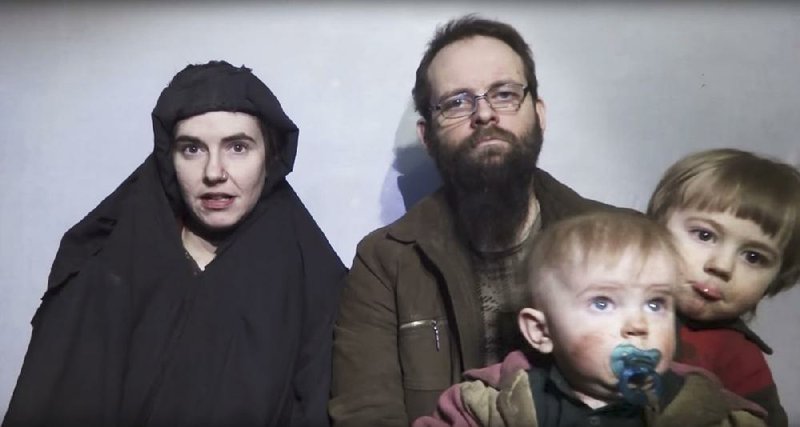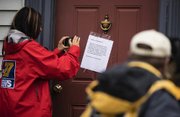WASHINGTON -- Five years after being taken hostage in Afghanistan, an American woman and her Canadian husband, along with their three children -- all three born in captivity -- are free after a dramatic rescue orchestrated by the U.S. and Pakistani governments, officials said Thursday.
U.S. officials said Pakistan accomplished the release of Caitlan Coleman of Stewartstown, Pa., and her husband, Joshua Boyle, who were abducted and held by the Haqqani network, which has ties to the Taliban. Their freedom, which came after years of U.S. pressure on Pakistan for assistance, unfolded quickly and ended with what some described as a dangerous raid, a shootout and a captor's final, terrifying threat to "kill the hostage." The family is safe with Boyle receiving only a shrapnel wound, his family said.
Coleman and Boyle were kidnapped in October of 2012 while on a backpacking trip that took them to Russia, the countries of Kazakhstan, Tajikistan and Kyrgyzstan, and then to Afghanistan. Coleman was several months pregnant at the time.
"Today they are free," President Donald Trump said Thursday in a statement, crediting the U.S. government with securing the release "working in conjunction with the government of Pakistan."
Trump later praised Pakistan, saying "The Pakistani government's cooperation is a sign that it is honoring America's wishes for it to do more to provide security in the region. We hope to see this type of cooperation and teamwork in helping secure the release of remaining hostages and in our future joint counterterrorism operations."
Boyle and the high commissioner for Pakistan to Canada related harrowing circumstances surrounding the family's rescue from captors.
They described gunshots ringing out as Pakistani forces intercepted the captors' car in which Boyle, his wife and their children were being transported in the trunk.
Boyle told his parents that there'd been a shootout and that the last words he'd heard from the kidnappers were, "kill the hostage," his father, Patrick told The Toronto Star after speaking with his son. Three intelligence officials said the confrontation happened near a road crossing in the Nawa Kili area of the district of Kohat in northwest Pakistan.
The high commissioner, Tariq Azim Khan, said, "We know there was a shootout, and Pakistan commandos carried out an attack and rescued the hostages."
The Pakistani military said early Thursday that the couple and their children were "being repatriated to the country of their origin."
But as of midday Thursday, the family's precise whereabouts was unclear, and it was not immediately known when the family would return to North America. The family was not in U.S. custody, and the couple and their children were together in a safe, undisclosed location in Pakistan, according to a U.S. national security official, who wasn't authorized to discuss the case publicly and spoke on condition of anonymity.
A U.S. military official said that a military hostage team had flown Wednesday to Pakistan, prepared to fly the family out. The team did a preliminary health assessment of the family and had a transport plane ready to go. But sometime after daybreak there, as the family members were walking to the plane, Boyle said he did not want to get aboard.
Boyle's father said his son did not want to board the plane because it was headed to Bagram Air Base, a site associated with accusations of prisoner abuse, and Boyle was philosophically opposed to going there. Another U.S. official said Boyle was nervous about being in "custody" given his past family ties.
He was once married to Zaynab Khadr, the older sister of former Guantanamo Bay detainee Omar Khadr and the daughter of a senior al-Qaida financier. Her father, the late Ahmed Said Khadr, and the family stayed with Osama bin Laden briefly when Omar Khadr was a boy.
The Canadian-born Omar Khadr was 15 when he was captured by U.S. troops following a firefight and was taken to the U.S. detention center at Guantanamo Bay. Officials had discounted any link between that background and Boyle's capture, with one official describing it in 2014 as a "horrible coincidence."
The U.S. Justice Department said neither Boyle nor Coleman are not wanted for any federal crime.
The couple told U.S. officials and their families they wanted to fly commercially to Canada.
The military official said the couple and their children are still in Pakistan, and there are ongoing discussions about how and when they will leave. The official said the U.S. is still prepared to fly the couple and their children out of Pakistan if that is their choice.
Boyle's father called the rescue a "miracle." Coleman's parents, Jim and Lyn Coleman, meanwhile, posted a statement on the door of their Pennsylvania home expressing joy. During an interview with ABC News, Lyn Coleman said "I am in a state of euphoria, stunned and overjoyed."
On Wednesday night, Trump alluded to the family's impending release. "America is being respected again," the president said in a speech on his tax plan in Harrisburg, Pa. "Something happened today where a country that totally disrespected us, called with some very, very important news. And one of my generals came in, they said, you know, I have to tell you, a year ago they would have never done that. It was a great sign of respect. You'll probably be hearing about it over the next few days."
He echoed those comments Thursday, this time mentioning Pakistan by name and saying the family's release showed that the country was "starting to respect the United States again."
Pakistan's relationship with the U.S. has been rocky. The U.S. has long accused its military and its intelligence agency of harboring or ignoring militants, and relations have grown increasingly strained over Pakistan's role in Afghanistan.
In a statement about the hostage release, the Pakistani army said: "The success underscores the importance of timely intelligence sharing and Pakistan's continued commitment towards fighting this menace through cooperation between two forces against a common enemy."
The release came together rapidly Wednesday. It happened nearly five years after Coleman and Boyle lost touch with their families while traveling in a mountainous region near the Afghan capital, Kabul.
Coleman's parents last heard from their son-in-law on Oct. 8, 2012, from an Internet cafe in what Boyle described as an "unsafe" part of Afghanistan.
The only trace of the couple since has been in the form of videos released by their captors and family letters.
Coleman's parents told the online Circa News service in July 2016 that they received a letter from their daughter in November 2015, in which she wrote that she'd given birth to a second child in captivity. It's unclear whether they knew she'd had a third child.
"I pray to hear from you again, to hear how everybody is doing," the letter read.
Boyle's parents say their son told them in a letter that he and his wife tried to protect the children by pretending their signs of captivity were part of a game being played with guards.
Earlier attempts to get the family released fell short. In January 2016, Colin Rutherford, a Canadian, was freed after Qatar arranged a prisoner swap with the Afghan government. Officials had hoped Rutherford's release would be the first in a series of releases that would include Coleman and her family.
But that never materialized, for reasons that remain unclear. President Barack Obama's administration sought to jump-start talks with the Taliban, but those efforts faltered after the U.S. military killed Mullah Akhtar Muhammad Mansour, the Taliban's leader, in a drone strike in May 2016.
U.S. officials call the Haqqani group a terrorist organization and has targeted its leaders with drone strikes. But the group also operates like a criminal network. Unlike the Islamic State group, it does not typically execute Western hostages, preferring to hold them for ransom.
The U.S. has long criticized Pakistan for failing to aggressively go after the Haqqanis. In recent remarks on his Afghanistan policy, Trump noted billions paid to Pakistan "at the same time they are housing the very terrorists that we are fighting. But that will have to change, and that will change immediately."
In his statement Thursday, Trump described the release as "a positive moment for our country's relationship with Pakistan."
Canadian Prime Minister Justin Trudeau, speaking during a visit to Mexico on Thursday, thanked Canada's allies around the globe for their work in freeing the family.
"We're pleased that the ordeal that they've been through these past years has finally come to an end," he said.
Information for this article was contributed by Jill Colvin, Lolita C. Baldor, Munir Ahmed, Matthew Lee, Deb Riechmann, Rob Gillies and Jon Gambrell of The Associated Press; and by Adam Goldman of The New York Times.
A Section on 10/13/2017

